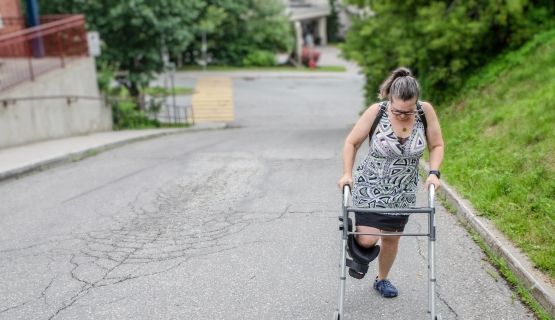Return to work, accommodation and support
IWH has a long history of conducting research on practices, policies and processes that help workers sustainably return to work after an illness or an injury. This page pulls together IWH research and resources on employer supports, job accommodations and modifications, as well as other related issues such as disclosure of disability.
Featured

Research Highlights
Telementoring program addresses return-to-work challenges for Ontario health-care providers
An IWH study has found that Ontario health-care providers face a range of challenges when treating workers with a work-related injury or illness and helping them return to work—a telementoring program called ECHO Occupational Environmental Medicine helped providers overcome some of these challenges.
Published: July 8, 2025

At Work article
Injured workers face mental health challenges beyond diagnosable conditions
Workers with a work-related physical injury that takes them off the job can have a wide range of mental health experiences, beyond diagnosable conditions. That’s according to an IWH study which also found that differences in injured workers’ mental health were linked to return-to-work outcomes.
Published: April 9, 2025
Journal article
Journal article
Age differences in return-to-work following injury: understanding the role of age dimensions across longitudinal follow-up
Published: Journal of Occupational & Environmental Medicine, December 2020
Journal article
Journal article
The working disadvantaged: the role of age, job tenure and disability in precarious work
Published: BMC Public Health, December 2020
IWH Speaker Series
IWH Speaker Series
Does it matter what workers’ reasons are for disclosing or not disclosing a disability at work? Why and how?
Deciding whether or not to disclose a disability to others at work is a complex consideration. People with many chronic mental and physical health conditions, often called episodic disabilities, experience times of relative wellness punctuated by intermittent periods of activity limitations. How do they decide whether or not to disclose their health conditions? In this presentation, Dr. Monique Gignac shares findings from her study examining participants' reasons and goals for disclosing—and whether these matter to work support outcomes.
Published: November 2020

Tools and guides
Working with a rheumatic disease
This interactive tool is designed for youth and young adults with rheumatic health conditions such as juvenile arthritis or lupus as they begin their working lives. It is designed to help them identify and address the unique challenges they may face when looking for work, already working or unable to work due to their health condition.
Published: November 2020

At Work article
Depressive symptoms in people with arthritis linked to lower employment rates
Research has shown that people with arthritis face difficulties finding work and staying at work. Now, a new study finds that when people with arthritis also have depressive symptoms, the risks of work disability are even greater.
Published: October 2020

Research Highlights
Depression and work among adults with arthritis
About 13 per cent of working-age people in the U.S. who have arthritis also experience depressive symptoms. Having both arthritis and depressive symptoms lowers the likelihood of working. For people aged 35 to 54, having depressive symptoms in addition to arthritis lowers the likelihood of working by 17 per cent.
Published: October 2020

Research Highlights
Employer perspectives on communication challenges when supporting episodic disabilities
Supporting people with episodic health conditions can be challenging from organizational perspectives. The challenges stem from the need to provide accommodation and support while respecting workers’ right to privacy, and to respond to unpredictable periods of disability while ensuring work units meet productivity demands.
Published: September 2020

IWH in the media
Greater focus on episodic disabilities needed: Study
Disability management must adapt and create a new model to reflect the impact of episodic disabilities among employees, writes John Dujay on a study led by Dr. Monique Gignac, scientific co-director and senior scientist at the Institute for Work & Health.
Published: Canadian HR Reporter, August 2020

At Work article
Workplaces face many complex challenges when managing episodic disabilities: study
Employers are recognizing that they need a new model of disability management to support workers with episodic health conditions, according to a new IWH study. These conditions can raise a host of issues for workplaces, including issues of trust, stigma and privacy.
Published: August 2020

Research Highlights
Urban-rural differences in work disability duration
People who live in more remote areas have more disability days following a work-related injury than people who live in large cities. However, there are exceptions to that pattern. Disability days are highest in the most remote rural areas. But they're second highest in the least remote rural areas, where at least 30 per cent of workers commute to an urban centre.
Published: July 2020